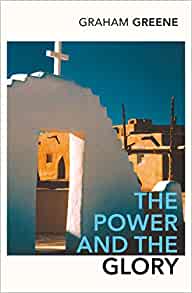All the Graham Greene novels I read and enjoyed in my last teens, when I first discovered him, have sat on my bookshelves for years waiting to be revisited. It wasn’t easy to choose a starting point but in the end I plumped for The Power and the Glory, on the basis that it was (I think) the title recommended to me by an English teacher and thus the first one I read.
Set in Tabasco, a state in Mexico, in the 1920s it tells the story of a priest on the run at a time when the Communist government was trying both to suppress Catholicism and to enforce prohibition. Greene coined the term “whiskey priest” for people like his unnamed, alcoholic dependent, central character.
In a sense it’s a quest story as the man moves from place to place in an increasingly hopeless search for safety – and even when he gets across the border his conscience drives him back to face his inevitable fate. At heart he is conditioned to turn the other cheek and put his fellow human beings first. Not that he conforms, in any way, to anyone’s idea of a “good” man but he is deeply uneasy about some of the things he’s reduced to such as granting absolution in return for alcohol.
Greene, who understands traditional Catholic mentality very well, explores the condundra, ambiguities and unease perceptively. The priest – who hasn’t been allowed properly to be one for some years – has a bossy mistress (whom he has come to loathe) and a child that he’d like the freedom to love and get to know. His travels take him through their village. He is greeted, wherever he goes, with a mixture of conditioned reverence, contempt and fear. It is a capital offence to harbour a priest and the local police are enthusiastically hunting this one with the exception of one individual who is arguably the novel’s moral compass.
I did not notice, when I first read this the parallels between this situation and 16th century England when some of the great Catholic houses had hidden chapels and priest holes in which to hide the resident priest if they were raided. It also – in 2021 – feels oddly topical given that we’ve recently seen churches closed and people punished for meeting in private houses. Patterns repeat themselves for different reasons.
The writing in The Power and the Glory is graphically evocative. There’s a lot of squalor along with the anguish and Greene makes sure the reader feels it. I also felt, and was moved by the priest’s very human failings. He is frightened of pain, for example. He doesn’t want to put other people in danger but, for a long time, it’s a matter of survival.

Next week on Susan’s Bookshelves: Father! Father! Burning Bright by Alan Bennett